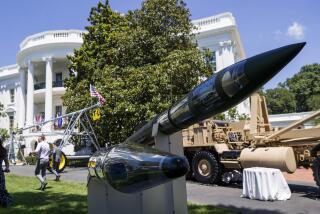Boeing Gets Big Contract From Army
- Share via
Boeing Co. won a major contract Thursday to develop an entire network of new weapons, communication systems and intelligence-gathering sensors that the Pentagon hopes will one day revolutionize the way the Army fights wars.
In a major boost to Southern California’s defense industry, Boeing’s space and communications unit, headquartered in Seal Beach, was the surprise winner over two other leading defense firms to win the contract, which has a potential value of at least $4 billion over the next five years.
Defense analysts said the overall value could top $10 billion as elements of Future Combat Systems are deployed over the next decade.
The Army for the first time is asking a single defense contractor to oversee development of a range of new technologies and weapons that would bring the service into the digital age.
The new weapons, which could include robotic land cruisers and high-powered microwave cannons, would be linked by complex battlefield command and control data networks and leading-edge intelligence-gathering sensors.
Infantrymen, linked by satellites, also would have unprecedented access to information about where they are, who is around them and where the enemy might be positioned.
“Future Combat Systems is a major step in the transformation of the Army,” said Claude M. Bolton Jr., assistant secretary of the Army for acquisition, logistics and technology, as he announced the contract winner.
Because the design of the network would rely heavily on emerging technologies, the Defense Advanced Research Projects Agency, a Pentagon unit that funds leading-edge weapons development, is assisting the Army with the program.
“We are very excited about the opportunity to partner with [the Defense Advanced Research Projects Agency] and Army,” said James Albaugh, president of Boeing’s space and communications business. “It is really the first of the true transformational programs for the Pentagon.”
It is unclear how many jobs the program will eventually require, but Albaugh said several hundred engineers would be needed for the initial development phase.
The program is a key component of a Pentagon goal to create a digital Army that would be “faster, lighter and smarter” than the current force tied to the more traditional ways of fighting.
The transformation reflects post-Cold War realities in which U.S. troops are expected to fight swift regional skirmishes rather than set battles with heavy weaponry, defense analysts said. The conflict in Afghanistan further pushed the urgency of transforming the Army, they said.
“It could turn out to be the biggest thing that has ever happened to the Army and be worth a corresponding amount of money for Boeing,” said Loren Thompson, a defense policy analyst with the Lexington Institute.
The Army, within the next decade, wants the ability to place a combat-ready brigade anywhere in the world within 96 hours, a full division in 120 hours and five divisions on the ground within 30 days. Currently it can take several weeks to deploy a brigade, mainly because of the logistics of transporting heavy vehicles.
Under the program, which could include billions of dollars more in follow-up work, Boeing engineers in Anaheim--and some in Seattle--will initially design and develop the system of weapons and technologies that the Army could start deploying by 2006.
An immediate goal would be to develop a vehicle that would weigh dramatically less than the 70-ton M-1A1 tank, which cannot be readily transported by air. Despite being lighter, the new vehicle would have the same firepower. For instance, Boeing engineers envision an armored vehicle that would weigh about 16.5 tons, carry a lethal laser gun and have advanced sensors that would give the crew the ability to spot the enemy before it can be detected.
The contract is one of the more significant moves yet by the Pentagon to allow defense contractors to become so-called lead systems integrators and have more responsibility in developing military systems rather than individual weapons, vehicles or aircraft.
“They want us to define the architecture, and they’re going to let us pick out the best technology for it,” said Felicia Campbell, a Boeing spokeswoman. “This is a new way of doing acquisitions that is very revolutionary for the Army.”
As such, the contract was highly sought by the defense firms, although the initial award of $154 million is relatively small in Pentagon terms. Lockheed Martin Co. and General Dynamics Corp., which teamed with a bevy of defense firms, vied for the contract.
Boeing, which is partnered with San Diego-based Science Applications International Corp., was considered an underdog because its space and communications unit, although a large contractor for the Air Force and spy agencies, had not done much work for the Army.
The announcement of the contract award was made after the stock market closed. Boeing shares declined $1.38 to $48.48 on Thursday on the New York Stock Exchange.
The initial 16-month contract calls for Boeing to define the concept for the combat systems. The Pentagon then plans to spend $1billion a year for four years to have Boeing develop the system and then begin testing prototypes.
The value of the contract for Boeing could exceed $4billion because it would have a say in what types of technologies to use. As one of the largest defense contractors in the world, it already is developing many of the technologies that could make up the elements of the Army’s future combat system.
The Army is essentially asking Boeing to develop an “entire family of weapon systems that are supposed to integrate the benefits of digital technology into every facet of Army war fighting,” Thompson said. “It’s supposed to create an entire integrated architecture.”
More to Read
Inside the business of entertainment
The Wide Shot brings you news, analysis and insights on everything from streaming wars to production — and what it all means for the future.
You may occasionally receive promotional content from the Los Angeles Times.










